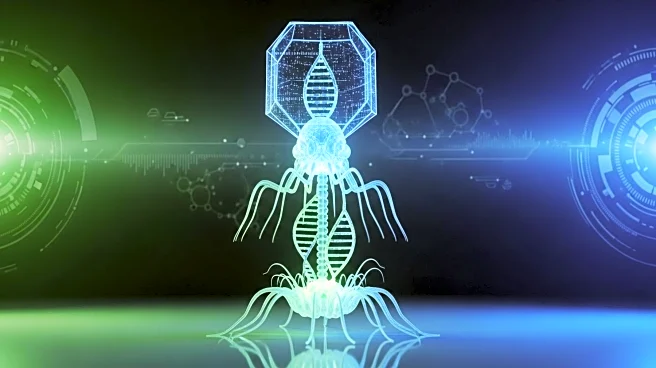What is the story about?
What's Happening?
Researchers at the Arc Institute, in collaboration with Nvidia, have successfully designed 16 complete and functional bacteriophage genomes using artificial intelligence (AI). This development marks a significant step in combating antibiotic-resistant infections. The AI model, known as Evo 2, was trained on a vast dataset of over 9.3 trillion nucleotides, encompassing a wide range of species. The newly designed bacteriophage genomes were generated to offer a novel approach to phage-based therapies, which are crucial in addressing the growing issue of antibiotic resistance. The research, which has not yet been peer-reviewed, demonstrates the potential of AI in whole genome design, moving beyond traditional methods that focus on individual genes.
Why It's Important?
The development of AI-designed bacteriophage genomes is a breakthrough in the fight against antibiotic resistance, a major public health concern. Antibiotic-resistant bacteria pose a significant threat to global health, agriculture, and food security. By creating bacteriophages that can effectively target and destroy these resistant bacteria, this research could lead to new treatments that are more effective than current antibiotics. The ability to design entire genomes also opens up possibilities for more targeted and efficient therapies, potentially reducing the reliance on traditional antibiotics and slowing the spread of resistance.
What's Next?
Future research will likely focus on expanding the capabilities of AI models to design larger and more complex phage genomes. This could provide greater flexibility and modularity in phage design, allowing for more precise targeting of multi-drug resistant bacteria. Additionally, the success of this project may encourage further investment in AI-driven biotechnology solutions, potentially leading to new innovations in the field of genetic engineering and synthetic biology.
Beyond the Headlines
The use of AI in genome design raises important ethical and regulatory questions. As AI becomes more integrated into biotechnology, there will be a need for clear guidelines and oversight to ensure that these technologies are used safely and ethically. The potential to create entirely new organisms also poses questions about the long-term ecological impacts and the need for responsible stewardship of these powerful tools.

















